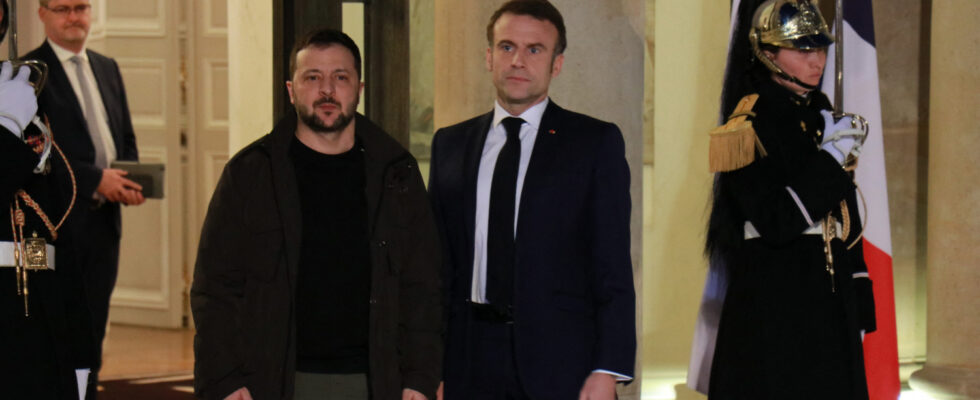Volodymyr Zelensky signed a security agreement with Emmanuel Macron on Friday evening in Paris, who promised “up to three billion euros” in additional military aid for 2024 to Ukraine, in addition to the seven billion in support already announced through Berlin.
An agreement for a “duration of ten years”
After German Chancellor Olaf Scholz during the day, the French president in turn set long-term civil and military support for kyiv in stone with a bilateral text. So much eagerly awaited support while the Ukrainian army is struggling against the Russians and American aid is frozen. In this text concluded for “a period of ten years”, France undertakes to provide in 2024 “up to three billion euros” in “additional” military aid to Kiev, after support which it estimates at 1.7 billion in 2022 and 2.1 billion in 2023. Paris mentions in particular a strengthening of “cooperation in the field of artillery”.
The agreement provides for “the provision of comprehensive assistance to Ukraine” for “the restoration of its territorial integrity within its internationally recognized borders”, “active deterrence and measures to be taken in the face of any further aggression” from Russia , as well as “support” for kyiv’s membership in the European Union and “interoperability with NATO”. “France confirms that Ukraine’s future membership in NATO would constitute a useful contribution to peace and stability in Europe,” this new pact also stipulates.
Volodymyr Zelensky’s European tour was overshadowed by the announcement of the death in prison of Alexei Navalny, number one opponent of Vladimir Putin, who already rules Russia with an iron fist, exacerbating tensions with the West and further extinguishing any hope of opening in Moscow. The master of the Kremlin will have to “be held accountable for his crimes”, accused Volodymyr Zelensky. Russia condemns “free spirits” to death by putting them in the “gulag”, launched Emmanuel Macron. He “paid for his courage with his life”, added German Chancellor Olaf Scholz.
The Ukrainian president, visiting his European allies as his country prepares to enter its third year of war against Russia on February 24, had previously stopped in Berlin on Friday. Olaf Scholz and Volodymyr Zelensky also signed a security agreement described as “historic” by the German Chancellor who assured his determination to support Ukraine “as long as necessary” against the Russian aggressor.
“We will not relax our support for Ukraine”
“Two years after the start of this terrible war, today we are sending a very clear message to the Russian president: we will not relax our support for Ukraine,” warned the German leader. Illustration of this commitment: the signed document contains additional and immediate military aid in the amount of 1.1 billion euros, which is a tranche of the seven billion in support already announced by Germany for 2024.
He also plans to support Ukraine after the war to build a modern army capable of repelling possible future attacks from Russia. “Our security agreement is a truly unprecedented bilateral document,” the Ukrainian president stressed in Berlin. This diplomatic escape is crucial for Volodymyr Zelensky at a time when the situation has deteriorated considerably on the Ukrainian front.
In the east of the country, Avdiïvka is the epicenter of “fierce fighting” and now threatens to fall after months of Russian assaults. The Ukrainian army announced on Friday that it had withdrawn from a position it held south of this city in the face of increasing Russian assaults.
A possible return to power of Donald Trump worries Ukraine
Russian troops are on the offensive, in large numbers, when the Ukrainian army lacks men, weapons and ammunition. American aid, an envelope of 60 billion dollars blocked for several weeks by the Republicans in Congress, is also sorely lacking. And the possible return to power at the end of the year of Donald Trump, who threatened to no longer support certain Allies against Russia if they did not pay more within NATO, is also raising concerns.
These security agreements are supposed to give Ukraine guarantees of long-term support, pending possible integration of the country into NATO. The UK was the first to conclude such a pact with kyiv in January. During the last summit of the Atlantic Alliance in Vilnius in July 2023, the member countries of the organization, led by the United States and Germany, disappointed the expectations of Ukraine – and many Eastern European countries – by not setting a timetable for the country’s accession.
The G7 powers had therefore decided to negotiate bilateral partnerships with kyiv. Twenty-five other states have joined this initiative, such as Poland. Concretely, these security agreements may concern the granting of military equipment, interoperable with that of NATO, the training of Ukrainian forces and the strengthening of Ukraine’s defense industry. Volodymyr Zelensky will continue his mini diplomatic tour on Saturday at the Munich Security Conference (MSC), the annual meeting of the geopolitical elite in southern Germany, which runs until Sunday.
